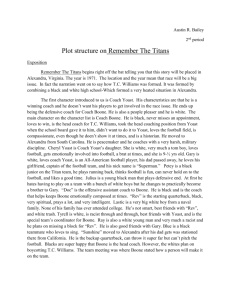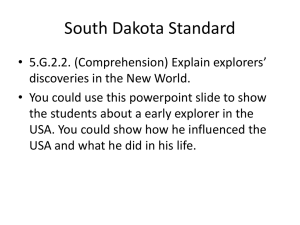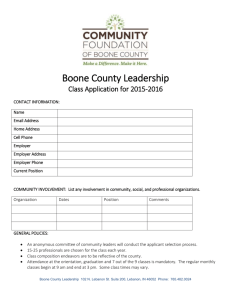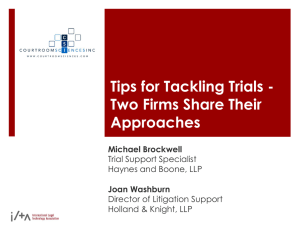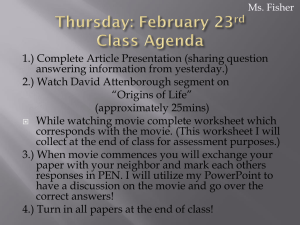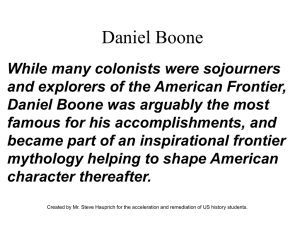Winning Leadership Style: Remember the Titans
advertisement
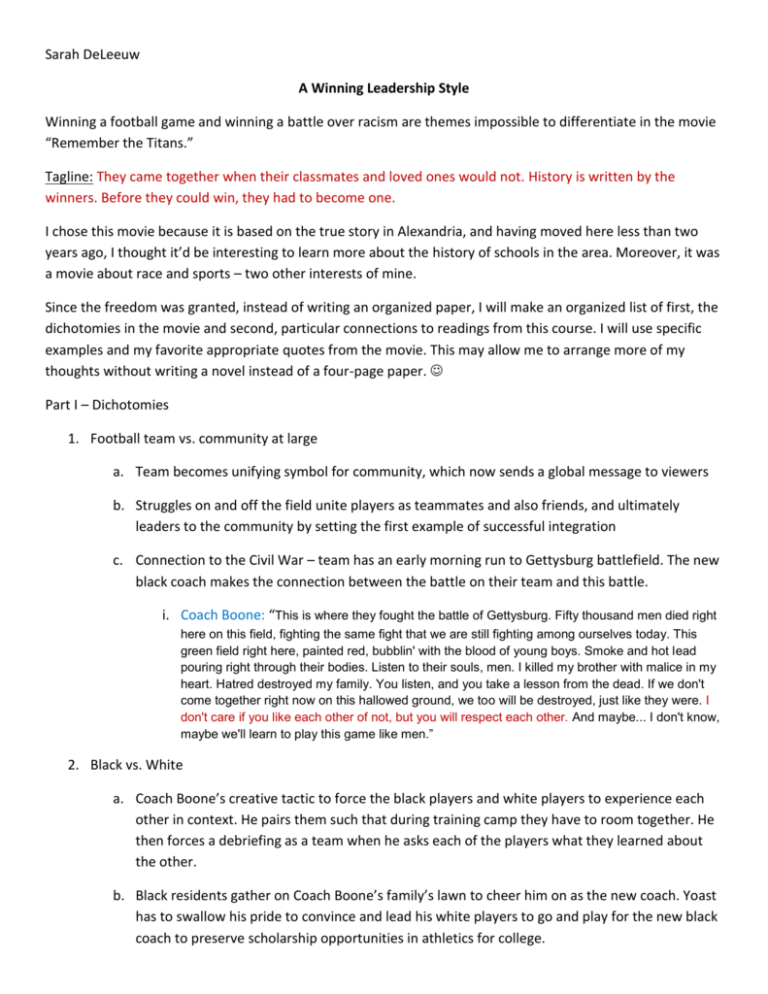
Sarah DeLeeuw A Winning Leadership Style Winning a football game and winning a battle over racism are themes impossible to differentiate in the movie “Remember the Titans.” Tagline: They came together when their classmates and loved ones would not. History is written by the winners. Before they could win, they had to become one. I chose this movie because it is based on the true story in Alexandria, and having moved here less than two years ago, I thought it’d be interesting to learn more about the history of schools in the area. Moreover, it was a movie about race and sports – two other interests of mine. Since the freedom was granted, instead of writing an organized paper, I will make an organized list of first, the dichotomies in the movie and second, particular connections to readings from this course. I will use specific examples and my favorite appropriate quotes from the movie. This may allow me to arrange more of my thoughts without writing a novel instead of a four-page paper. Part I – Dichotomies 1. Football team vs. community at large a. Team becomes unifying symbol for community, which now sends a global message to viewers b. Struggles on and off the field unite players as teammates and also friends, and ultimately leaders to the community by setting the first example of successful integration c. Connection to the Civil War – team has an early morning run to Gettysburg battlefield. The new black coach makes the connection between the battle on their team and this battle. i. Coach Boone: “This is where they fought the battle of Gettysburg. Fifty thousand men died right here on this field, fighting the same fight that we are still fighting among ourselves today. This green field right here, painted red, bubblin' with the blood of young boys. Smoke and hot lead pouring right through their bodies. Listen to their souls, men. I killed my brother with malice in my heart. Hatred destroyed my family. You listen, and you take a lesson from the dead. If we don't come together right now on this hallowed ground, we too will be destroyed, just like they were. I don't care if you like each other of not, but you will respect each other. And maybe... I don't know, maybe we'll learn to play this game like men.” 2. Black vs. White a. Coach Boone’s creative tactic to force the black players and white players to experience each other in context. He pairs them such that during training camp they have to room together. He then forces a debriefing as a team when he asks each of the players what they learned about the other. b. Black residents gather on Coach Boone’s family’s lawn to cheer him on as the new coach. Yoast has to swallow his pride to convince and lead his white players to go and play for the new black coach to preserve scholarship opportunities in athletics for college. c. Parallels of negotiation in relationships i. Yoast vs. Boone and Gerry vs. Julius (next points (3 and 4)) ii. Bertier and his girlfriend 1. Throughout the movie, Bertier and his girlfriend break up. She cannot understand his bond with his black teammate. Near the end of the movie, she comes around and shakes Julius’s hand. This tiny gesture is another huge symbol of change inspired by the team’s example. iii. The two coaches daughters (Sheryl Yoast and Nicky Boone) on several occasions portraying the innocence of the norms – My interpretation: They didn’t choose to be racist; they were raised in a community that expected it. Upon meeting for the very first time: 1. Sheryl: “Why do you dress so weird?” Nicky: “Look who’s talking.” d. Louis Lastik’s character of not understanding that there is racial tension (big fat dumb white guy with no friends) i. Julius: “What you doin' man?” Louie Lastik: “Eatin' lunch” Julius: “I see you eatin' lunch, but why you eatin' over here? Why not go eat over there and eat with your people?” Louie Lastik: “Man, I don't have any people. I'm with everybody, Julius.” Petey Jones: “Yeah, he's just a light-skinned brother.” Julius: “Yeah, and I'm a dark-skinned cracker.” e. Cheering at the end of the movie is both for the winning touchdown – the team’s victory but also for the community’s victory of coming together over racism i. Sheryl: “People say that it can’t work, black and white. Here, we make it work every day. We still have our disagreements, of course, but before we reach for hate, always, always, we remember the Titans.” (as a reflection after the movie) 3. Yoast vs. Boone a. Boone becomes Head Coach over Yoast. Boone asks Yoast to become Assistant Head Coach, and Yoast says no, until later… i. Boone: “We are in a tough spot, coach. You, me, the whole city. I think it’d go a long way to smooth things over if you’d stay, work on the staff, be a defensive coordinator, assistant head coach.” Yoast: “Work under you.” Boone: “If that’s the way you see it.” Yoast: “Good night, Coach.” b. Boone’s military-style approach to coaching vs. Yoast’s laid-back more conservative approach i. Boone: “This is no democracy. It is dictatorship. I am the law.” c. Boone more of a leader and Yoast more of a manager i. Boone’s focus is on creating relationships as much as skills ii. Boone’s focus on vision for future and not the past or even present iii. Yoast does not want change. Initially, he is waiting for Boone to lose so he can become head coach again. iv. Boone wants each player to become leaders themselves Note: Despite the above, at the end of the movie, the viewer admires and respects both coaches as leaders. They DO NOT leave thinking Boone was the sole leader or that Yoast is a racist. d. Shared goal actualizes as is evident in fact that Yoast jeopardizes his own admittance into the Hall of Game to make sure the game is called fairly. i. Yoast: (right after winning state championship) “I know football, and what you did with those boys. You were the right man for the job, Coach!” Boone: “And you’re a Hall-of-Famer in my book!” (SO cheesy, but SO perfect) e. Yoast verbalizes that he’s come around. i. Yoast: “I hope you boys have learned as much from me this year as I've learned from you. You've taught this city how to trust the soul of a man rather than the look of him. And I guess it's about time I joined the club. “ 4. Gary vs. Julius a. Gary – arrogant white All-American and Julius – black linebacker, whose bond inspires and leads the rest of the team to allow this bond b. Personal conflict that viewer feels apart of as it unravels i. Initial conflicts begins to develop respect 1. Bertier: “Listen, I'm Geery, you're Julius. Let's just get some particulars and get this over with.” Julius: “Particulars? Man, no matter what I tell you, you ain't never gonna know nothing about me.” Bertier: “Listen, I ain't running any more of these three-a-days” Julius: “Well, what I've got to say, you really don't wanna hear 'cuz honesty ain't too high upon your people's priorities.” Bertier: “Honesty? You want honesty? Honestly, I think you're nothing. Nothing but a pure waste of God-given talent. You don't listen to nobody, man! Not even Doc or Boone! Shiver push on the line everytime and you blow right past 'em! Push 'em, pull 'em, do something! You run over everyone in this league, and everytime you do you leave one of your teammates hanging out to dry, me in particular!” Julius: “Why should I give a hoot about you, huh? Or anyone else out there? You wanna talk about the ways you're the captain?” Bertier: “Right.” Julius: “You got a job?” Bertier: “I've got a job.” Julius: “You been doing your job?” Bertier: “I've been doing my job.” Julius: “Then why don't you tell your white buddies to block for Rev better? Because they have not blocked for him worth a blood nickel, and you know it! Nobody plays. Yourself included. I'm supposed to wear myself out for the team? What team? Nah, nah what I'm gonna do is look out for myself and I'ma get mine.” Bertier: “See man, that's the worst attitude I ever heard.” Julius: “Attitude reflects leadership, captain.” Discussion: What does Julius really mean with his last line here? c. Gerry Bertier is in a car accident and becomes paralyzed. Julius, along with the other on the team, visit him. Bertier demands to see Gerry. i. Nurse: “Only kin is allowed in here.” Bertier: “ Alice, are you blind? Don’t you see the family resemblance? That’s my brother.” Part II – Connections to Readings 1. Fullan - “Ultimately, your leadership in a culture of change will be judged as effective or ineffective not by who you are as a leader, but by what leadership you produce in others.” a. Fullan’s Five Components of Leadership are obvious in the movie i. Moral Purpose – Shared goal of winning games but overcoming racism ii. Understanding Change – Reflecting on history and community but yearning to overcome this and instigate change iii. Relationships, relationships, relationships – integral in this movie iv. Knowledge Building – really getting to know differences v. Coherence Making – How the pieces powerfully come together for a desired end (and it wouldn’t have worked with one missing piece) 1. Exemplified when team holds its own meeting (without coaches) to resolve issues and again when they come up with a defining cheer as ONE 2. Gardner - “…it is important to avoid stereotyping or caricaturing. I must try to understand persons on their own terms, make an imaginative leap when necessary, seek to convey my trust in them, and try so far as possible to make common cause with them and to be worthy of their trust…I am obliged to make the effort, and not merely to assume that what I had once believed on the basis of scattered impressions is necessarily true. Such humility may in turn engender positive responses in others” a. On how respect and ethics guide relations with other human beings 3. Hahn – “With freedom comes responsibility. We are interrelated. We don’t have freedom to do what we want. We have freedom to make right decisions or not, but there are repercussions for others.” a. On how decisions affect others. Must choose what’s best for the common good. b. Also, on Boone’s reflections with this wife. Ex. He asks if he is too hard on the boys. 4. Machiavelli – “It is therefore necessary to be a fox to recognize traps and a lion to frighten the wolves.” a. On Boone’s use of power and authority. As we found some positives in Machiavelli, we find Boone’s use of power necessary and positive. 5. Wheatley – from videos presented in class a. “People support what they create.” – Ownership leads to care and success of unified goal. “Expect leaders to come from anywhere.” – Boone unexpected to white community. “Humans can handle anything as long as we are together.” – Bertier’s response lying paralyzed in the hospital, “Coach, I’m hurt. I’m not dead.” “We were together. I forget the rest.” – by the end of the movie the original factions are forgotten. b. Also, as response to chaos, the conflict in this movie is an opportunity for change. 6. Bordas – In the movie, the teams pulls together and adds their own ‘flavor’ to their warm-up routine. This can be compared to what the salsa resembles in Bordas’ article.
